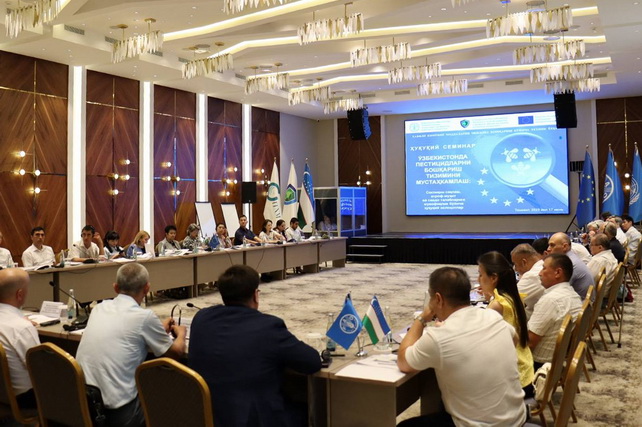
High-Level Legal Workshop on Strengthening Pesticide Management System Held in Uzbekistan
High-Level Legal Workshop on Strengthening Pesticide Management System Held in Uzbekistan
Tashkent, Uzbekistan (UzDaily.com) — Today in Tashkent, a legal workshop was held on "Strengthening Pesticide Governance in Uzbekistan: Legal Reforms for Health, Environment, and Trade Compliance."
This important event was organized by the Food and Agriculture Organization of the United Nations (FAO) in collaboration with the Ministry of Ecology, Environmental Protection and Climate Change, with financial support from the European Union within the framework of the "Technical assistance for sound management of hazardous chemicals" project. Approximately 40 representatives from ministries and agencies, international organizations, non-governmental non-profit organizations, and national and international experts participated in this important event.
The main objectives of this legal workshop were:
Raising awareness among policymakers and stakeholders about legal and institutional problems in the field of pesticide management, as well as achievements made in this direction;
Encouraging dialogue on Uzbekistan's accession to the Rotterdam Convention and full implementation of the Globally Harmonized System of Classification and Labelling of Chemicals (GHS);
Examining legal solutions for improving coordination mechanisms between ministries;
Identifying practical measures for reforming pesticide registration, licensing, application and disposal procedures in accordance with international best practices;
Supporting measures for the gradual phase-out of highly hazardous pesticides and encouraging registration of less hazardous pesticides.
Sherzod Umarov, Assistant FAO Representative in Uzbekistan said: "Today's workshop is an important step on the path to bringing Uzbekistan's pesticide management system to the level of international standards. We strive to strengthen coordination between ministries, implement a modern licensing system, and apply a comprehensive approach to ensure public health and environmental safety".
The workshop addressed critical gaps in Uzbekistan's current pesticide governance framework, including the absence of comprehensive lifecycle management systems, limited coordination among regulatory bodies, and the need for alignment with international safety standards. Proper pesticide management is essential not only for protecting farmers and consumers but also for ensuring environmental sustainability and meeting international trade requirements.
Four thematic sessions were held within the framework of the workshop. The first session examined the issue of forming a coordinated legal system. The second session was dedicated to institutional cooperation mechanisms. The third session discussed licensing and control practices. The fourth session examined issues of harmonization with the Rotterdam Convention and GHS system.
International expert Stephan Robinson in his presentation touched upon global trends in pesticide lifecycle management, existing opportunities, and tasks facing Uzbekistan. He emphasized the global call for action against highly hazardous pesticides and the importance of transitioning to safer alternatives.
FAO International Legal Consultant Irina Kireeva presented specific recommendations for harmonizing Uzbekistan's legislation with international standards based on the results of legal analysis conducted by the organization.
The workshop highlighted the urgent need for comprehensive pesticide legislation that covers all stages of the pesticide lifecycle – from production and import to safe disposal of containers and waste. Participants emphasized that effective pesticide governance requires not only strong legal frameworks but also adequate institutional capacity, inter-ministerial coordination, and stakeholder engagement.
At the end of the workshop, participants developed preliminary recommendations for legal reforms and strengthening institutional capacity in the field of pesticide management. A specific action plan for implementing these recommendations will be developed in the near future.
This workshop is considered an important step in establishing safe and sustainable agricultural practices, protecting public health and environmental protection in Uzbekistan while ensuring the country's agricultural sector can meet international standards and trade requirements.